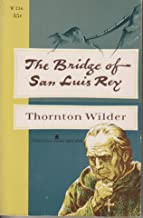The Bridge of San Luis Rey, Thornton Wilder 1927
Thornton Wilder’s second novel was the Pulitzer Prize winner as well as the best selling novel in 1938. It continues to be read, adapted, and cited up until today. Unlike so many books from my library that are more than a few years old, the cover image for this book is actually the one for the volume I read, a falling apart 1955 Pocket Library edition that sold for 35 cents.
The book tells the tale of Brother Juniper, a monk in Peru in 1714, who witnesses the deaths of five people who had been walking across the eponymous bridge when it broke and they fell to their deaths. The bridge had been built by the Incas several hundred years earlier and had always been the main road for foot traffic between Lima and Cuzco in the mountains. Brother Juniper, seeking some physical evidence for his faith, embarks on an investigation of the lives of the five victims, trying to find either deep sin or saintly living that could explain why these five and no others were on the bridge at that moment it failed.
We meet the Marquesa of Montemayor and her companion and helper, young Pepita, the identical twin Estaban, and Uncle Pio and his young charge, Jaime, and in three long chapters, we learn the details of their lives. None of them are so remarkable that they would be remembered for long after their deaths, and this is the lesson that Juniper (who, by the way is burned at the stake by the Inquisition for his impious goal of searching for science to back his faith) arrives at. We are all waging a great battle; we live briefly, die and will be forgotten; love is the only thing that matters in this world.
The book has over the nearly century after its publication become the prime example of the tale of the contingency of life and death. We are all hanging by that thread that held the bridge up all those centuries, and at any moment, the thread can snap and we can die, to be remembered by those who we have loved for a brief time, and then, like all of humanity, forgotten.



